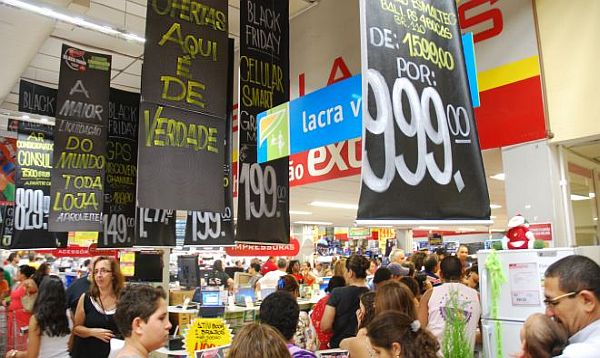Black Friday in Latin America, when there isn't even a Turkey Thursday?
Versions of Black Friday and Cyber Monday now take place on a variety of scales in Mexico, Chile, Argentina, Colombia, Ecuador, Costa Rica, Panama, Nicaragua, El Salvador, Honduras, Peru, and Brazil. This North American import continues to grow every year, although not without some controversy.
Mexico City saw a 12 percent increase in Black Friday sales, and Pedro Eugenio, the founder of the Brazilian discount website Busca Desconto that helps organize online sales in that country, is predicting $146 million in online revenues, a 60 percent increase compared to 2012.
Mexico’s version, which actually took place November 15th - 18th, is known as "The Good Weekend," or "El Buen Fin". Even though it isn't tied to Thanksgiving on the calendar, it produces scenes of trampling and confusion similar to those in the United States.
This year’s Good Weekend generated $12 billion in sales for eighty thousand outlets in Mexico City according to Jorge Dávila Flores, the president of CONCANACO, the national federation of chambers of commerce.
In Brazil, one of the world’s fastest growing consumer countries, Black Friday sales started late on Thursday evening. While a large part of the action occurs on the Internet, superstores like Walmart and its Brazilian equivalent, Extra, hold large sales that draw crowds of thousands.
"People yelling and grabbing," is how Elaine Ferreira, an employee at an Extra in Rio, described the scene. "People line up and burst into the store. If there’s a good deal on some electronics like TVs."
"Last year, I went to the stores but I bought 90 percent online," said Diego Duarte de Sousa, a 26-year-old financial analyst from Rio. "You don’t have to confront the chaos in the stores."
Despite a financial crisis, middle-class Argentine consumers scramble for deals during as a way to beat the high inflation.
Paula Di Virgilio, a 32-year-old banker and Buenos Aires resident, has been underwhelmed by previous Black Friday sales, but was more positive about this year. "Last year the discounts were not good," she said, "but this year I have read that multiple brands have signed on to Black Friday."
But Di Virgilio also points out a major problem with Black Friday sales in Latin America. "Honestly, buying outside the country can save you a lot more," she said.
Mexican stores usually mark down less than outlets in the United States do, and items on sale in Brazil still remain far more expensive than the US prices because of high tariffs on foreign goods.
And retailers in both Mexico and Brazil have been caught raising prices in the weeks before sales events in order to offer them at the "discounted" original price. In Brazil, this scam has come to be known as "Black Fraud Day."
Thursday night, Extra superstores were draped with black banners reading, "Thousands of offers – that's it the truth," but São Paulo state reported Friday morning that Extra, along with other stores, have had hundreds of registered complaints filed against them on a consumer monitoring site that keeps a Black Friday "Black List."
But Black Friday shoppers in Latin America are hopeful that the tradition will continue to grow. "I sincerely think it’s a good thing in Latin America if it’s done right," said Di Virgilio.
"We’re still behind the United States’ Black Friday in quality of products and the organization of the stores," said Rio's Duarte de Sousa. "But I think this a start."
Original Story


